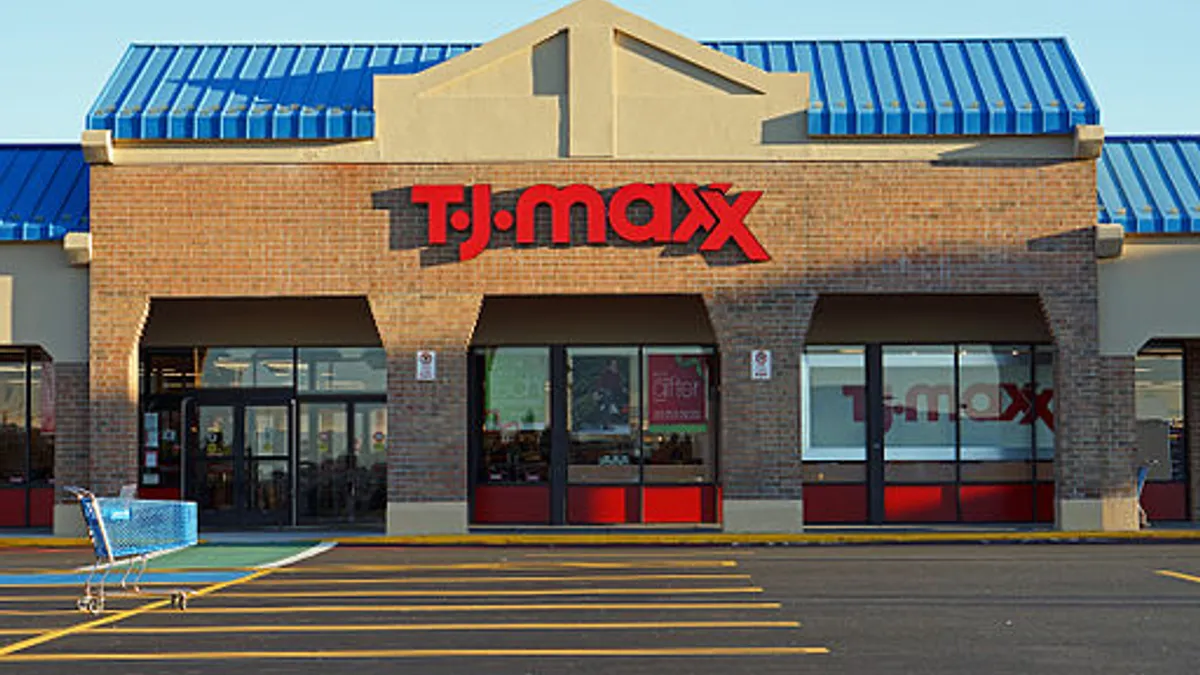Dive Brief:
-
In a performance that topped analyst expectations in several measures, off-price retailer TJX Cos., which runs T.J. Maxx, Marshalls, HomeGoods, Sierra and Homesense, on Wednesday said that third quarter net sales fell 3.2% year over year to $10.1 billion.
-
Store comps, excluding e-commerce and locations closed due to the pandemic, fell 5%, according to a company press release. Total inventories as of Oct. 31 declined to $5 billion from $6.3 billion in the year-ago quarter, due to planning, stronger-than-expected sales and supply chain bottlenecks.
-
Pretax profit margin fell a 0.7 percentage point to 10%, as a "very strong merchandise margin increase was more than offset by significant operating costs related to COVID-19" and the sales decline, the company said. Net income rose 4.6% to $866 million from $828 million a year ago.
Dive Insight:
Despite the pandemic continuing to roil the supply chain and keep 470 stores temporarily closed (the "vast majority" in Europe), TJX pulled off third quarter results that beat not only analysts' expectations, but also its own.
The company's strong play in home worked to its benefit in the quarter, as stay-at-home orders fuel a boom in the category. Store comps at HomeGoods rose 15%, as they fell 10% at Marmaxx (Marshalls plus T.J. Maxx), 7% in Canada and 6% in Europe and Australia.
The company announced it will roll out e-commerce for HomeGoods later next year. Like most off-pricers, TJX otherwise maintains a slim e-commerce effort in order to encourage an in-store treasure hunt. Rivals Burlington and Ross don't sell online at all, citing difficult logistics and slim margins in selling apparel through the digital channel.
"We believe the launch of homegoods.com next year could expand the consumer base and attract a younger consumer," MKM Partners Managing Director Roxanne Meyer said in emailed comments Wednesday. "In our view, the home category translates better online vs. apparel and has the potential to be more impactful to TJX."
Inventory snafus in the quarter may have created a scarcity that helped avoid markdowns and boost margins, but they could present a problem for the holidays, Meyer warned. The pandemic more generally introduces a few seasonal unknowns for a retailer so dependent on brick and mortar.
"[W]e continue to see several wildcards in 4Q that could impact performance," she said, including potential inventory delays, ongoing store closures in Europe, management of lines and indoor shopping during peak times, and the extent to which demand was pulled forward into the third quarter, as so many retailers worked to do. "A more dire scenario would include a reduction in store traffic and even worse, store closings and a renewal of supply chain issues stemming from a worsening pandemic, which would once again likely impact sales at off-pricers the most."
The flip side of the current strength in home goods is the pandemic's hit to apparel sales, which represent most of TJX's assortment. GlobalData Retail Managing Director Neil Saunders in emailed comments called it a "big issue."
"Against this backdrop, a decline in sales is unavoidable," Saunders said. "There have been some better performances in segments such as beauty, athletic wear, and homewares — but as these are smaller elements of the product mix at most Marshalls and TJMaxx stores they have not been sufficient to offset the declines in core apparel lines."
That means that the end of the pandemic is important not just for the holidays but longer-term as well.
"[O]nce the pandemic ends, the company is in a good position to take further share as it will see gains from failed retailers such as Stein Mart and will also benefit from its low-price proposition which will be appealing to financially stretched customers," Saunders said. "However, the hard truth is the business will not get firmly back on track until the pandemic has ended and normal life resumes."















